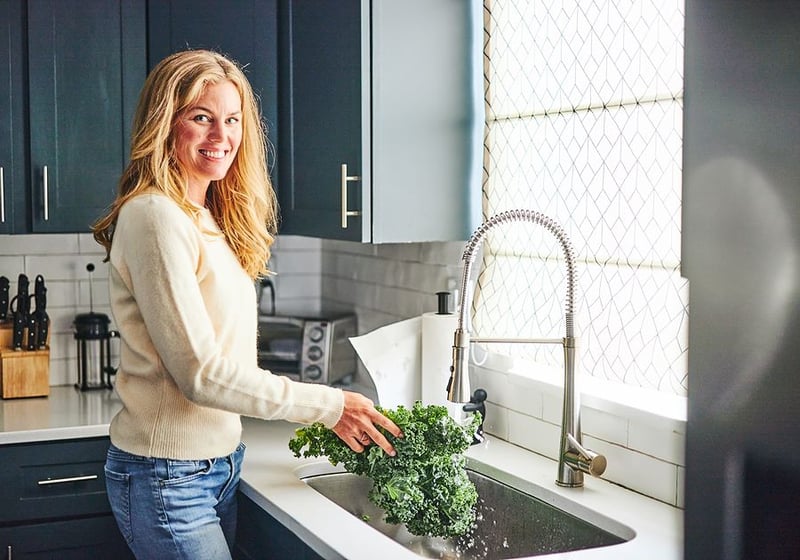
Are you looking to transition to a plant-based diet? Maybe you are already following a vegetarian or vegan diet, but looking for some guidance on how to make sure you have the correct balance of nutrients.
A well-balanced plant-based diet can help you achieve your health and wellness goals.
However, if not done properly, you may be missing out on key nutrients, which can impact both your short-term and long-term health.
We all want to be and stay healthy - so, optimizing your eating within your personal plant-based lifestyle is your key to success.
But, what if you aren’t exactly sure how to do that? What if you feel like you need more support?
This is where a nutrition coach comes in.
Nutrition coaches, like myself and my team at OnPoint Nutrition, are educated and trained to help you implement and/or maintain a plant-based diet.
In this article, I’ll outline the main goals for plant-based eating:
-
Eating a variety of plant-based foods to ensure adequate nutrient intake
-
Finding staple meals, snacks, and recipes
-
Supplementing, as needed, to fill any potential gaps in your diet
-
Managing health conditions using a plant-based diet
We’ll also dive into how a nutrition coach can help you achieve your plant-based goals by addressing:
-
What to eat
-
How to meal plan
-
How to grocery shop
-
How to navigate challenging situations
Plant-Based Eating Goals
Eat A Variety Of Plant-Based Foods
A vegetarian or vegan diet can provide you with all of the nutrients you need. However, it may take some extra thought and planning to fit certain nutrients into your regular eating routine.
The number one goal of working with a nutrition coach on a plant-based diet is to make sure that you are eating the right foods in the right combinations to ensure you are getting enough of all of the nutrients you need regularly.
Protein, vitamin B12, vitamin D, iron, and calcium are a few nutrients that some vegetarians and vegans struggle to get enough of on a regular basis, which means they should be a particular focus for you.
Your nutrition coach will help you make sure you are getting everything you need to optimize your health.
Find Staple Meals and Snacks
One of the biggest challenges when switching to a plant-based diet is to find new staple foods. Your regular rotation of meals, snacks, and recipes will likely need to shift to accommodate your new lifestyle.
Whether you’re looking to slowly phase out animal products or do a full diet overhaul, your nutrition coach will help walk you through the transition so you can find substitutes and replacements that work for you.
The goal is to eat in a way that feels good, while still enjoying the food you are eating!
Supplement To Fill Potential Gaps
Most nutrition coaches will take a “food first” approach to eating. This means that the goal is to get as many nutrients as possible from the food you eat, and only use supplements to fill in any potential gaps in your diet.
It is possible to meet 100% of your nutritional needs when eating a vegetarian or vegan diet, but sometimes it can be a challenge. A vegan diet is more limited than a vegetarian diet, so vegans are more likely to need to rely on supplements for a few key nutrients.
Your nutrition coach will help you evaluate your overall nutrient intake, suggest food sources of nutrients you may be missing, and provide guidance on supplements as needed.
Manage Health Conditions
Plant-based diets can help improve your overall health, as well as reduce your risk for developing chronic diseases including:
-
Cancer
-
Heart disease
-
Alzheimer’s
-
Stroke
-
Kidney disease
-
COPD
If you are interested in transitioning to a vegetarian or vegan diet to help control or prevent these conditions, your nutrition coach can help you find the right balance of plant-based foods for you and your health concerns.
How A Nutrition Coach Can Help You Optimize Your Plant-Based Diet
What To Eat
Most notably, your nutrition coach will help you determine what to eat on your plant-based diet.
As with any eating pattern, it is important to include a variety of foods from all food groups including:
-
Fruits
-
Vegetables
-
Healthy fats
Protein is the food group that will need the most adjusting on a plant-based diet. Plant-based protein sources include:
-
Tofu
-
Tempeh
-
Beans
-
Legumes
-
Nuts
-
Seeds
-
Meat alternatives
Your nutrition coach will help you incorporate more plant-based protein sources while maintaining an overall balanced intake.
How To Meal Plan
Planning ahead is a key to success for any eating pattern. However, when it comes to following a plant-based diet, planning your meals and snacks with your nutrition coach will help ensure you are always prepared and getting everything you need.
Oftentimes, when transitioning to a plant-based diet it is easy to over-consume carbohydrates and under-consume protein. Planning ahead, and utilizing your nutrition coach’s expertise, will help make sure you don’t make this common mistake.
You may also be experimenting with new foods and new recipes so having a plan to follow makes these changes less intimidating.
Your nutrition coach will help you plan your meals and snacks for success.
How To Grocery Shop
Again, you will likely be experimenting with new items so knowing what to buy is key.
Your nutrition coach will help you not only plan your meals and snacks but also plan what you need to stock up on to make sure that plan can be executed. You’ll want to buy foods from all food groups and be mindful that you are incorporating variety within each food group as well.
Your nutrition coach will guide you through the transition from buying more animal products to more plant-based products.
How To Navigate Challenging Situations
Going out to eat, attending dinner parties, and other social events that involve eating may pose a challenge to your new lifestyle. However, these situations don’t have to. You can be social and stick to your plant-based diet, too.
Many restaurants have vegetarian and vegan options or at least options to customize menu items to make them fit your preferences.
Your nutrition coach will help you navigate these potentially tricky situations so you can go into them feeling confident.
Where To Go From Here
If you are ready to optimize your plant-based diet, you are in the right place.
At this point, you know that eating a variety of plant-based foods to ensure adequate nutrient intake, finding staple meals, snacks, and recipes, supplementing, as needed, to fill any potential gaps in your diet, and managing health conditions using a plant-based diet are the goals of working with a nutrition coach on plant-based eating.
You also know that when you work with a nutrition coach you will learn what to eat, how to meal plan and grocery shop, and how to navigate challenging situations to thrive on your plant-based diet.
If you’re looking for a step-by-step plan to help you establish a healthy routine and stick to it, check out our Vegan and Vegetarian Meal Plans.
If you are ready to dive into nutrition counseling with a nutrition coach, we are here for you.
Our team of dietitians and nutritionists has helped over 3,000 people, just like you, achieve their nutrition and health goals.
If you’re interested in finding out more about OnPoint and the experience we provide to our virtual, one-on-one nutrition counseling clients, learn more about our client experience here.
When you are ready to take the leap, schedule your free consultation.
Topics

Liz has been reading nutrition labels since she learned how to read. Growing up with severe peanut and tree nut allergies she learned that it’s important to know what you are putting into your body. She made her first big lifestyle change as a freshman in high school, when she decided to become a vegetarian. However, it wasn’t until she took a food class in Italy as part of a study abroad program in college that it clicked in her mind that she wanted to make food and nutrition her career. Liz graduated from Penn State University in 2015 with a bachelor's degree in Nutrition, as well as a bachelor's degree in Marketing. She completed her dietetic internship with Aramark in Philadelphia, and her master's degree at Northeastern University shortly after.




